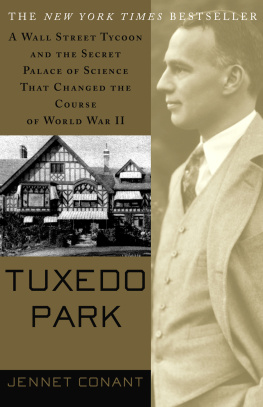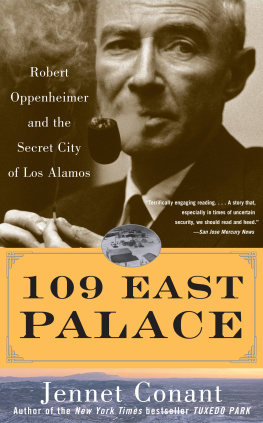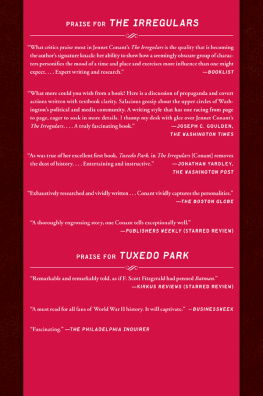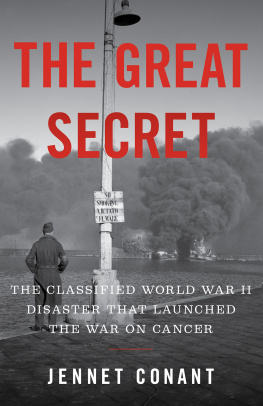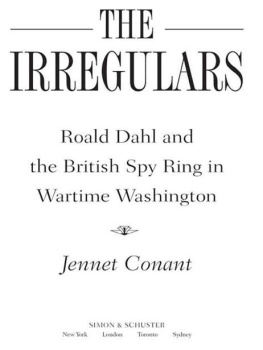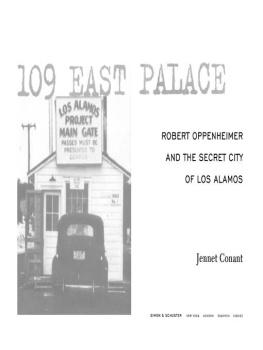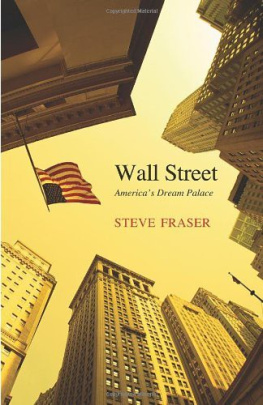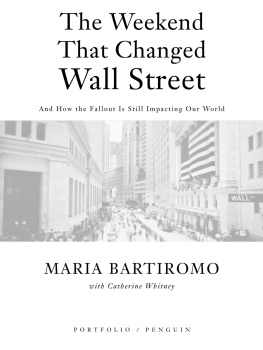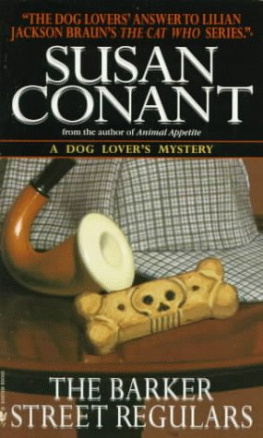Jennet Conant - Tuxedo Park- A Wall Street Tycoon and the Secret Palace of Science That Changed the Course of World War II
Here you can read online Jennet Conant - Tuxedo Park- A Wall Street Tycoon and the Secret Palace of Science That Changed the Course of World War II full text of the book (entire story) in english for free. Download pdf and epub, get meaning, cover and reviews about this ebook. year: 0, genre: Business. Description of the work, (preface) as well as reviews are available. Best literature library LitArk.com created for fans of good reading and offers a wide selection of genres:
Romance novel
Science fiction
Adventure
Detective
Science
History
Home and family
Prose
Art
Politics
Computer
Non-fiction
Religion
Business
Children
Humor
Choose a favorite category and find really read worthwhile books. Enjoy immersion in the world of imagination, feel the emotions of the characters or learn something new for yourself, make an fascinating discovery.
- Book:Tuxedo Park- A Wall Street Tycoon and the Secret Palace of Science That Changed the Course of World War II
- Author:
- Genre:
- Year:0
- Rating:3 / 5
- Favourites:Add to favourites
- Your mark:
- 60
- 1
- 2
- 3
- 4
- 5
Tuxedo Park- A Wall Street Tycoon and the Secret Palace of Science That Changed the Course of World War II: summary, description and annotation
We offer to read an annotation, description, summary or preface (depends on what the author of the book "Tuxedo Park- A Wall Street Tycoon and the Secret Palace of Science That Changed the Course of World War II" wrote himself). If you haven't found the necessary information about the book — write in the comments, we will try to find it.
Tuxedo Park- A Wall Street Tycoon and the Secret Palace of Science That Changed the Course of World War II — read online for free the complete book (whole text) full work
Below is the text of the book, divided by pages. System saving the place of the last page read, allows you to conveniently read the book "Tuxedo Park- A Wall Street Tycoon and the Secret Palace of Science That Changed the Course of World War II" online for free, without having to search again every time where you left off. Put a bookmark, and you can go to the page where you finished reading at any time.
Font size:
Interval:
Bookmark:
Praise for Tuxedo Park
An examination of the remarkable role of the shadowy but powerful amateur scientist whose intellect and energy spurred critical scientific research that shortened and helped win WWII.... Remarkable and remarkably told, as if F. Scott Fitzgerald had penned Batman .
Kirkus Reviews
By the time you are finished, you are prepared to bestow on Alfred Lee Loomis the title of Most Interesting Man I Never Knew Anything About.... Loomis and Conant are just right for each other.
Alex Beam, The New York Times Book Review
[Conants] group portrait offers a healthy reminder of how much good science depends on community and collaboration, not solitary genius.
The New Yorker
An eccentric, fabulously wealthy scientist performs groundbreaking experiments on the nature of time in his stone castle and, after hosting a sumptuous feast for his colleagues and friends, forces his guests to participate in brain-wave experiments while hypnotized. Something out of H. G. Wells or Mary Shelley? No, a real scene from the life of Alfred Lee Loomis, the extraordinary American financier, scientist, and philanthropist who played a pivotal role in the development of radar and the creation of the Manhattan Project during World War II. Jennet Conant... has written a fascinating biography of this unusual and impressive figure.
Richard Di Dio, The Philadelphia Inquirer
A must-read for fans of World War II history, and it will captivate students of science and technology.
Otis Port, Business Week
More than a vivid biography of Alfred Lee Loomis, this is a bright and intelligent portrait of a season of science in America that changed history.
Library Journal
Like the character of Loomis himself, this is a fabric woven of many strandsfinancial genius, brilliant inventiveness, a passion for science, human traits and appetiteseach essential to the emergent pattern.... Thanks to Conants efforts, the tapestry is at last on display.
Fred Bortz, Pittsburgh Post-Gazette
This is a very good book.... Once you start it, you will have a hard time putting it down.
Jeremy Bernstein, The Washington Times
In Tuxedo Park , Conant has indeed written a fascinating tale.
Jules Wagman, Milwaukee Journal Sentinel
Alfred Loomis has remained deep in the shadows of history until now.... Riveting.
Joseph Losos, St. Louis Post-Dispatch
Its a tale that sounds more like an Ian Fleming creation than truth: An eccentric tycoon brings the worlds brightest minds to a private enclave, where they develop inventions that alter world history.... Conant praises the financier-turned-scientists work and... also captures a tarnished image of Loomis the man.... Conant resurrects the explosive contributions of a man who harbored little interest in being remembered.
Stuart Wade, Austin American Statesman
No one man won World War II for us, but none exceeded Alfred Loomiss contribution. He was critical to crucial developments, everything from radar to the atomic bomb. He put into victory his genius, his energy, and his Wall Street fortune. Author Jennet Conant put all of her considerable talents into this biography, which is as superb as the subject.
Stephen E. Ambrose
Alfred Lee Loomis, who lived among the swells in a gated Tuxedo Park, hated F.D.R., rarely communicated with his wife and three sons, stole his best friends wife, and with icy disdain helped drive an aide to take his own life. Yet the Allies may not have won World War II without this man whom history forgot. As Jennet Conants heart-thumping book recounts, Loomis was a public-spirited citizen with the brilliance and ability to galvanize the scientific community to invent first the potent weapon that came to be called radar to spare London from bombs and to destroy U-2 boats, and later contributed to the making of the atom bomb. Long after you race to the end, this heroic story will linger in memory.
Ken Auletta
Thank you for downloading this Simon & Schuster eBook.
Join our mailing list and get updates on new releases, deals, bonus content and other great books from Simon & Schuster.
C LICK H ERE T O S IGN U P
or visit us online to sign up at
eBookNews.SimonandSchuster.com

For Steve and John
To advance scientific knowledge, pick a man of genius, give him money, and let him alone .
James B. Conant
You dont know what life really is
Till youve been to Tuxedo Park!
Chorus of a song from the musical Tuxedo by Henry J. Sayers, 1891
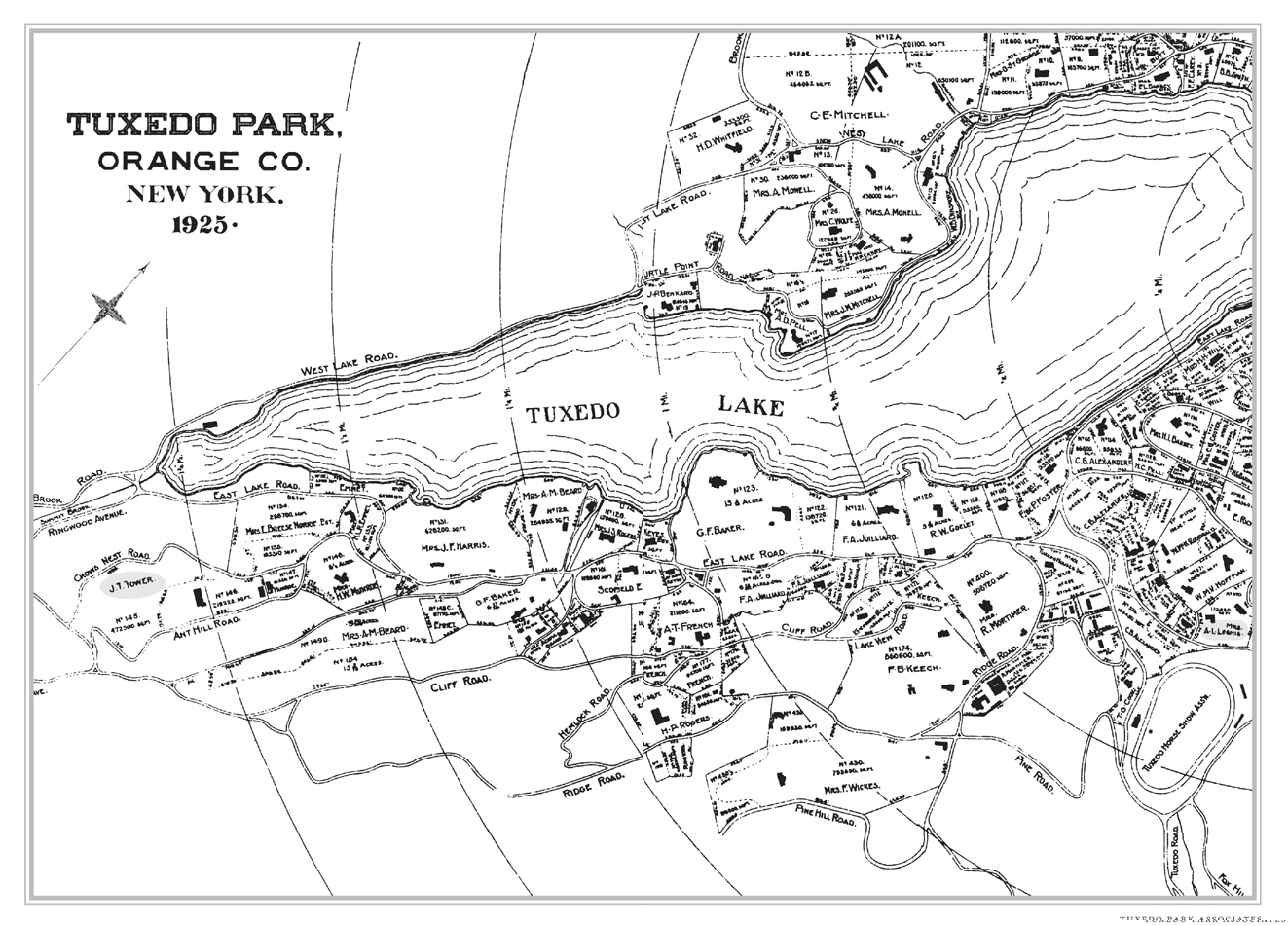
I F the phrase stranger than fiction ever described any series of events, it applies to the bizarre circumstances that surrounded the suicide of William Richards on January 30, 1940, on the eve of the publication of his novel, Brain Waves and Death . The book, which was written under a pseudonym, was a thinly veiled account of the legendary scientific laboratory owned by the millionaire Alfred Lee Loomis and the eccentric coterie of geniuses whose work he financed. Richards was an accomplished chemist and had for years enjoyed Loomis luxurious facilities in the exclusive enclave of Tuxedo Park, where his mansion was known to be a meeting place for the great names in science and finance. Richards, who was my great-uncle, came from a prominent Boston family and was painfully aware of his pedigreed seat in the countrys intellectual elite. His father, Theodore William Richards, was chairman of the Harvard Chemistry Department and a Nobel laureate. His sister, Grace Richards, was married to James B. Conant, who at the time was president of Harvard. In this rarefied company, it was not enough to be merely accomplishedanything less than extraordinary constituted a disappointment. Richards talents lay in music and art, but he was expected to strive for greatness in science. Before he turned forty, deciding he had fallen short of the mark, he killed himself. Within the Richards-Conant family, his suicide was regarded as a kind of weakness, a moral failure. It was not only a betrayal of his intellectual promise, but an embarrassing public expression of his private anguish. My grandfather used his influence to have the incident covered up, and it was never spoken of again.
My father, Theodore Richards Conant, knew only that he had lost his favorite uncle to some terrible tragedy. The deep air of mystery that surrounded Richards death, and his fictions rich and foreboding scientific detail, always haunted my father. He saved a copy of the scandalous novel, which was published posthumously and quickly disappeared, along with an unpublished short story about a scientist working to create the first atomic bomb, which my grandfather confiscated on the grounds that it was too close to the truth to dare publish in those dangerous times. The silence my grandfather imposed served only to distort and enlarge the family myths about William Richards, and in my fathers boyish eyes, he became a heroic figurerebellious, romantic, doomed.
Years later, when I was growing up, my father liked to tell lurid tales about Richards death. At funerals, usually held at the family plot in Mount Auburn Cemetery in Cambridge, Massachusetts, we would go hunt for his grave and that of his brother, who also committed suicide. My father always joked that every good Boston family should have a pew at St. Trinitys, a plot at Mount Auburns, and a gurney at McLeans (the local nuthouse). Once, when we were visiting 17 Quincy Street, the Harvard presidents house where he was raised, my father took me to an upstairs bedroom, pointed to the four-poster, and told me that this was where his uncles body had been found. He fed my fascination by telling me vivid, and wildly varying, accounts of what had happened. In one version, Richards had built an elaborate apparatus that he used to electrocute himself, and it was my horrified grandmother who discovered the corpse. Another time, he told my grandfathers Harvard biographer that the contraption had been rigged to an alarm clock that released a lethal dose of poison gas, killing Richards exactly the same way the characters in his novel were finished off. Neither account was accurate, but the biographer believed him, and so did I.
Next pageFont size:
Interval:
Bookmark:
Similar books «Tuxedo Park- A Wall Street Tycoon and the Secret Palace of Science That Changed the Course of World War II»
Look at similar books to Tuxedo Park- A Wall Street Tycoon and the Secret Palace of Science That Changed the Course of World War II. We have selected literature similar in name and meaning in the hope of providing readers with more options to find new, interesting, not yet read works.
Discussion, reviews of the book Tuxedo Park- A Wall Street Tycoon and the Secret Palace of Science That Changed the Course of World War II and just readers' own opinions. Leave your comments, write what you think about the work, its meaning or the main characters. Specify what exactly you liked and what you didn't like, and why you think so.

